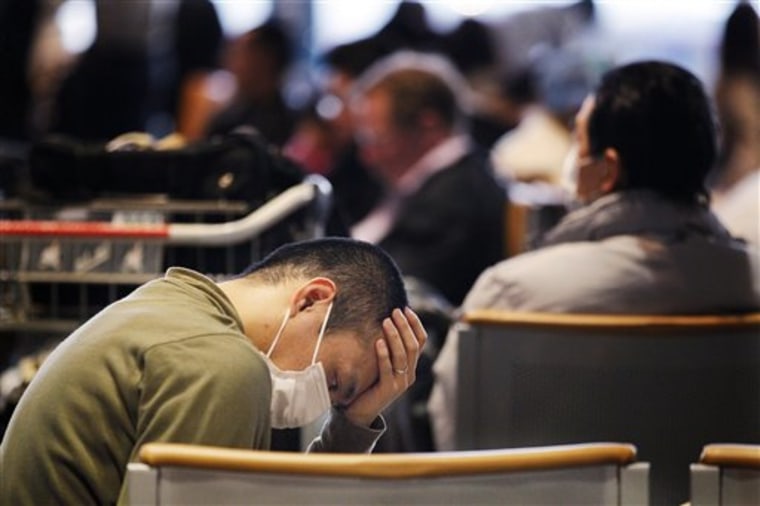Even as airlines added extra flights to get people out of Tokyo, their long-term plans for expansion there have been thrown into doubt.
Delta Air Lines Inc. said on Thursday that it will suspend new flights to Tokyo's Haneda airport beginning next week. Singapore Airlines has postponed plans for later this month to put the massive Airbus A380 on a flight from Singapore to Tokyo to Los Angeles currently served by a Boeing 747. The A380 has 96 more seats.
With parts of the country devastated by natural disasters, and a leaking nuclear plant, the airlines are scrambling as more people try to leave Japan while many others reassess plans to fly in.
"The natural disaster in Japan has left us all in deep shock," Lufthansa Chief Executive Christoph Franz said on Thursday. His airline has rerouted all Tokyo flights to Osaka and Nagoya instead.
United Continental Holdings Inc., the biggest U.S. carrier to Asia, isn't cutting flights but is monitoring the situation. Both United and Delta use Tokyo's Narita airport as a hub for flights further into Asia.
Airlines had planned to increase U.S.-Japan flying by 10.2 percent next month compared with April 2010, according to Barclays Capital. AMR Corp.'s American Airlines and Delta would have the biggest percentage increases. Both airlines just started flights to Tokyo Haneda airport earlier this year.
United Continental operates an average of 26 flights a day from Japan, both to the U.S. and to other cities in Asia. Delta has 40 flights on its busiest days. American has six flights a day from Japan to the U.S. Pacific flying is more than 11 percent of Delta's capacity and almost 15 percent for the combined United and Continental.
Delta said it would "temporarily suspend" its daily flight to Haneda from Los Angeles beginning March 23, and one from Detroit beginning March 24. It said it can reinstate the flights on short notice.
"Anxiety about possible escalation of the nuclear crisis and simply a fear of the unknown is driving behavior right now," said Andrew Herdman, director-general of the Kuala Lumpur-based Association of Asia Pacific Airlines.
Japanese authorities are struggling to cool down damaged nuclear reactors and pools of spent fuel at the Fukushima Dai-chi plant.
Other airlines kept their growth plans in place. Hawaiian Airlines, which just won permission to fly from Honolulu to Tokyo Haneda, is keeping that flight and adding a new flight to Osaka in July, spokesman Keoni Wagner said.
In the short run, more planes are going to Japan. Several Asian carriers added flights as more governments urged their citizens to leave. U.S. carriers, however, kept their schedules unchanged.
Cathay Pacific Airways, Hong Kong's biggest airline, usually operates seven flights a day to Japan; it added an extra flight to Tokyo for Thursday and Friday, after adding two on Wednesday.
"We are experiencing rapidly increasing demand from people wishing to return home to Hong Kong and elsewhere," Cathay Pacific Chief Operating Officer John Slosar said in a statement Wednesday.
A Cathay spokeswoman who declined to be named because of company policy said the airline has seen more empty seats on flights from Hong Kong to Tokyo.
Cathay and Italy's Alitalia were both offering one-way walk-up fares of around $800, which was a discount from the usual last-minute price.
Air China, the country's biggest airline, said it's using bigger planes for flights to Japan this week. Shanghai-based China Eastern Airlines added an extra flight Wednesday to Niigata Airport in western Japan, where 1,500 Chinese nationals were waiting to get back home, according to a Xinhua report. And China Southern Airlines is adding an extra flight on its Dalian-Nagoya route until March 21, with a bigger jet "to meet the surging evacuation demands," Xinhua said, citing a statement from the airline.
Scandinavian airline group SAS's flights from Tokyo to Copenhagen are full, but flights from Copenhagen to Tokyo are only half-full, spokeswoman Elisabeth Manzi said.
"The planes aren't empty, but there are significantly fewer passengers than normal," Manzi said.
"I'm going home because the situation is not very clear," said Sara Ghisleni, a 24-year old Italian student leaving Japan. "The Japanese media say that the situation is not very difficult but the other media is quite sure that the situation is dangerous, so we had to leave."
Choo Dong-hwi, a 35-year-old South Korean student, flew back to Seoul from Japan because of worries about radiation.
"I decided to come back to Korea just for a while because my family was very worried about me," he said.
Associated Press writers Kelvin Chan in Hong Kong, Eileen Ng in Kuala Lumpur Malin Rising in Stockholm, and AP Television News staff in Tokyo and Seoul contributed to this report.
